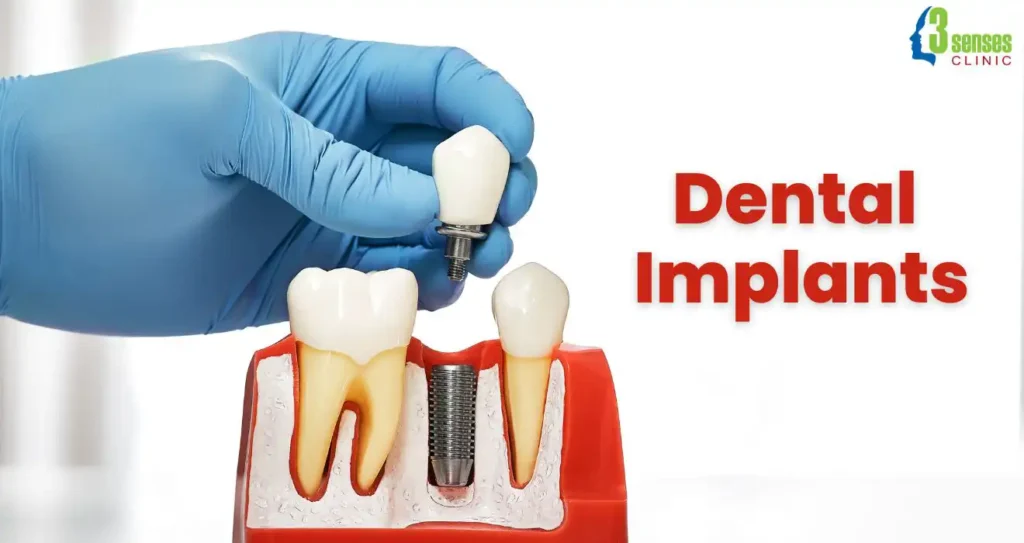Understanding Dental Implants: A Permanent Solution for Missing Teeth

Losing a tooth isn’t just a cosmetic issue — it can affect everything from your confidence to your ability to chew and speak properly. Fortunately, modern dentistry offers a reliable and long-lasting solution: dental implants.
In this blog, we’ll walk you through what dental implants are, how implant treatment works, the meaning of implants, and what to expect during implant surgery. Whether you’re considering this option or just curious, here’s everything you need to know.
What Are Dental Implants?
Simply put, dental implants are artificial tooth roots made of biocompatible materials (usually titanium) that are placed into the jawbone to support replacement teeth. These replacements could be crowns, bridges, or even dentures, depending on how many teeth are missing.
Unlike removable dentures or bridges, dental implants are fixed in place and mimic the structure and function of natural teeth. This means you can eat, speak, and smile with confidence — without worrying about slipping or discomfort.
Also Read: What is a Root Canal? Everything You Need to Know About RCT Treatment
Implant Meaning: More Than Just a Fake Tooth
When people hear the word implant, they often think of a fake tooth. But there’s more to it. The word implant refers specifically to the titanium post that’s surgically placed into your jawbone. Over time, this post fuses with the bone through a process called osseointegration, creating a sturdy foundation for the visible part of the tooth (the crown).
So, while the visible tooth (crown) is important for aesthetics, the implant itself is the hidden hero that ensures strength and stability — just like the root of a natural tooth.
Why Choose Dental Implants?
There are several reasons why dental implants are considered the gold standard in tooth replacement:
- Natural Look and Feel: Implants closely mimic natural teeth in appearance and function.
- Long-Lasting: With proper care, dental implants can last decades — often a lifetime.
- Preserve Bone Health: Implants stimulate the jawbone, preventing bone loss that often occurs with missing teeth.
- No Impact on Neighboring Teeth: Unlike dental bridges, implants don’t require grinding down adjacent healthy teeth.
- Improved Confidence: Say goodbye to gaps and hello to a confident smile.
Also Read: The Importance of Oral Health: A Guide to a Healthy Smile
The Dental Implant Treatment Process
Implant treatment is usually done in several stages and can take a few months from start to finish. Here’s a basic overview of what the process involves:
1. Initial Consultation
Your dentist or oral surgeon will begin by examining your mouth and taking X-rays or 3D scans. This helps determine if your jawbone is healthy and dense enough to support an implant.
2. Implant Surgery
If you’re a good candidate, the next step is implant surgery. This procedure is usually done under local anesthesia. The dentist will make a small incision in your gum to expose the jawbone, then carefully drill a hole and insert the titanium implant.
You might feel some discomfort or swelling afterward, but most people find recovery quite manageable.
3. Healing and Osseointegration
This is perhaps the most important phase. Over the next few months, the implant will gradually bond with your jawbone in a process called osseointegration. This creates a strong and stable base for your new tooth.
4. Placing the Abutment and Crown
Once healing is complete, an abutment (a small connector) is attached to the implant. The final step is placing a custom-made crown on top — crafted to match your surrounding teeth in color, shape, and size.
And voilà — you have a new tooth that looks and feels completely natural!
Is Implant Surgery Safe?
Implant surgery is a well-established and generally safe procedure when performed by an experienced dental professional. Like any surgery, it carries some risks — such as infection, nerve damage, or implant failure — but these complications are rare.
Proper oral hygiene and regular dental checkups will go a long way in ensuring the long-term success of your implants.
Who Can Get Dental Implants?
Most healthy adults with missing teeth are good candidates for dental implants. However, certain conditions may affect eligibility, including:
- Uncontrolled diabetes
- Severe bone loss in the jaw
- Heavy smoking
- Active gum disease
That said, even if you have some of these challenges, there may still be solutions — such as bone grafting — to prepare your mouth for implant treatment.
Final Thoughts
Dental implants offer an effective, long-term solution to tooth loss. They restore more than just your smile — they bring back function, comfort, and self-esteem.
If you’re wondering what dental implants are, or whether implant treatment is right for you, the best first step is to schedule a consultation with your dentist. With proper planning and care, implants can be a life-changing investment in your oral health.
FAQs
Q: How long do dental implants last?
A: With good oral hygiene and routine dental visits, implants can last 25 years or more.
Q: Is the implant procedure painful?
A: Most people report minimal discomfort during and after surgery, often less than a tooth extraction.
Q: What is the cost of dental implants?
A: The cost varies based on location, dentist experience, and the number of implants. However, many patients find the long-term benefits well worth the investment.

